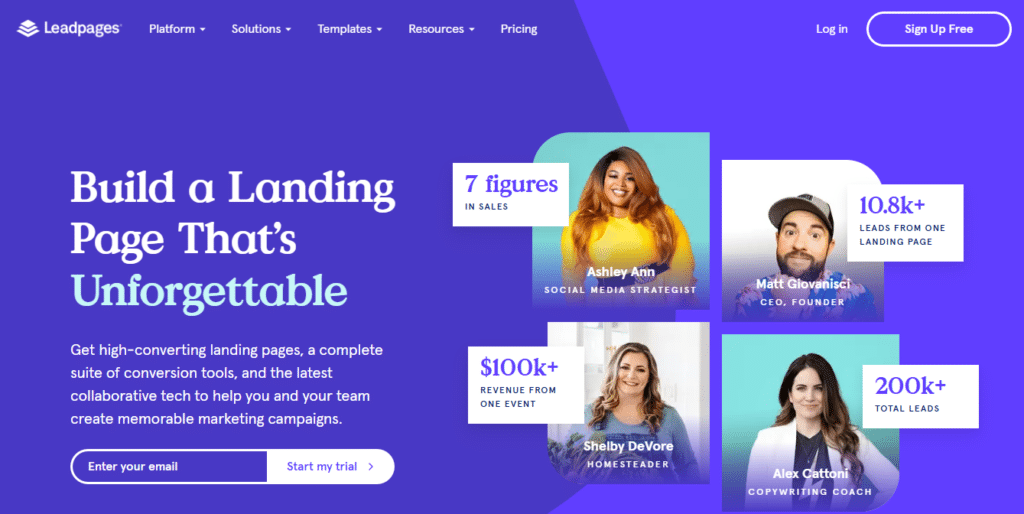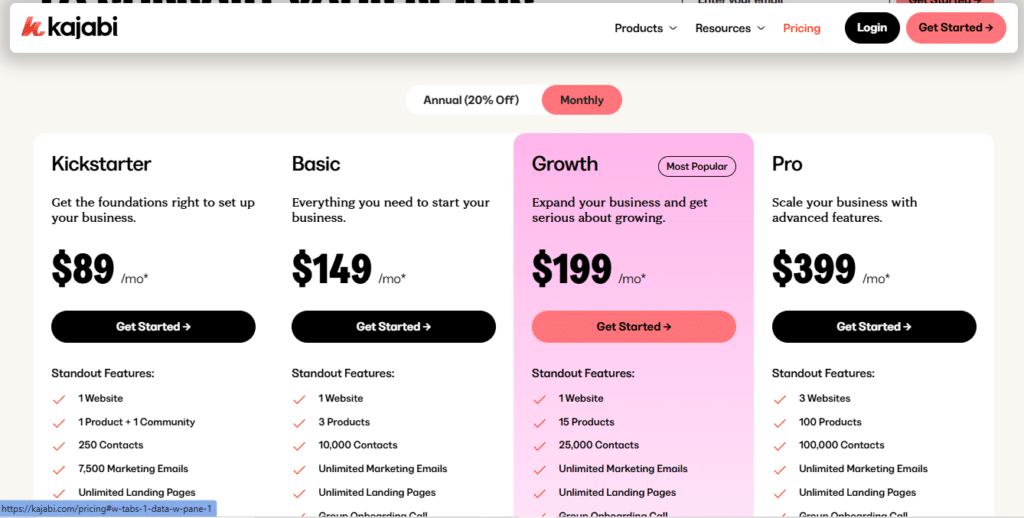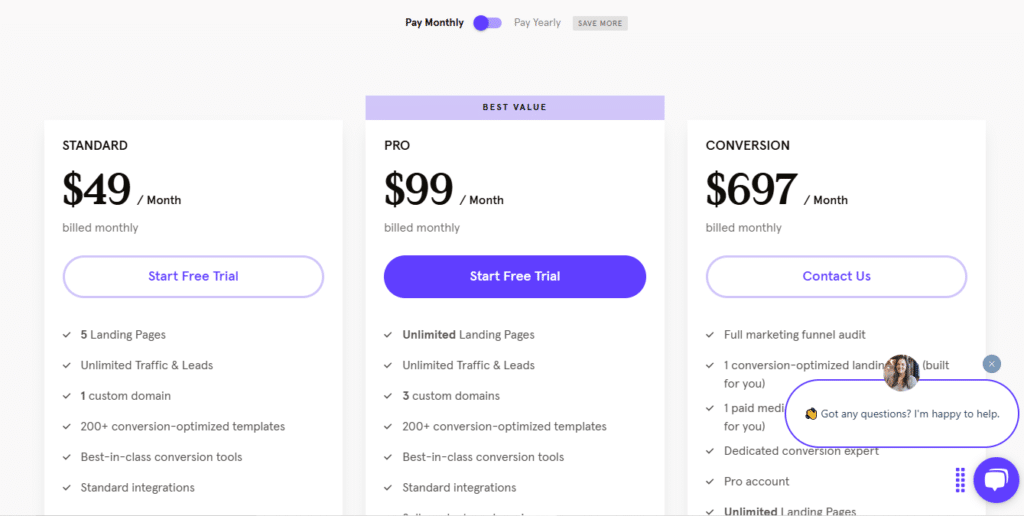Kajabi vs LeadPages: A Comprehensive Platform Comparison
When building an online business that combines course delivery with effective lead generation, choosing the right platforms can significantly impact your growth potential and operational efficiency. Kajabi and LeadPages represent two distinctly different approaches to digital business management. While Kajabi offers an all-in-one platform including course creation and marketing, LeadPages specializes in conversion-focused landing pages and lead generation. This detailed comparison will help you determine whether one platform can meet all your needs or if a combined approach would be more effective, depending on your specific business requirements.
Overview of Kajabi

Kajabi is an all-in-one platform designed for entrepreneurs, creators, and educators looking to build and scale their online businesses. It provides a comprehensive ecosystem for creating, marketing, and selling digital products such as online courses, memberships, and coaching programs—all without relying on multiple third-party tools.
With its integrated website builder, email marketing automation, and sales pipeline creation, Kajabi simplifies the process of running a digital business. Even users with minimal technical knowledge can easily create high-quality content using pre-built templates and intuitive drag-and-drop functionality. By integrating powerful marketing tools with a robust learning management system (LMS), Kajabi enables businesses to efficiently attract, engage, and convert their audience while maximizing revenue—all from a single, user-friendly dashboard.
Key Features of Kajabi
- Course Creation Tools: Develop and deliver engaging online courses with video content, assessments, and drip-fed lessons.
- Website Builder: Design fully responsive, professional websites with built-in blogging capabilities and customizable templates.
- Sales Pipelines: Create automated funnels for lead generation, product launches, and webinars.
- Email Marketing Automation: Send personalized email campaigns, track engagement, and automate follow-ups.
- Membership Capabilities: Set up subscription-based memberships to generate recurring revenue.
- Payment Integration: Securely accept payments via Stripe and PayPal with zero additional transaction fees.
- Analytics Dashboard: Monitor revenue, track customer behavior, and measure marketing performance with in-depth insights.
- Community Features: Build an interactive member space for discussions, engagement, and networking.
Ideal User Base for Kajabi
- Course Creators: Educators and professionals looking to monetize their knowledge through online courses.
- Coaches & Consultants: Those offering coaching services, webinars, and one-on-one mentorship programs.
- Membership Site Owners: Entrepreneurs looking to create thriving subscription-based communities.
- Digital Entrepreneurs: Individuals managing multiple digital products and looking for a streamlined business solution.
Overview of LeadPages

LeadPages is a specialized platform focused on converting visitors into leads and customers through high-performing landing pages, pop-ups, alert bars, and other conversion tools. Founded in 2012, LeadPages has established itself as a leading solution for businesses seeking to optimize their lead generation and conversion processes without requiring technical expertise or design skills.
Unlike all-in-one business platforms that attempt to cover every aspect of online business, LeadPages concentrates specifically on the critical conversion moments in the customer journey. The platform excels in creating professional, mobile-responsive landing pages optimized for lead capture, event registration, webinar sign-ups, and sales conversions. LeadPages combines drag-and-drop simplicity with conversion science, offering templates proven to convert through extensive A/B testing and real-world performance data.
What sets LeadPages apart is its focus on conversion optimization rather than just page creation. The platform provides tools like lead magnet delivery, integrated pop-ups, A/B testing capabilities, and detailed conversion analytics—all designed to maximize the effectiveness of every visitor interaction. While it doesn't offer course creation or membership management, LeadPages delivers specialized functionality that often outperforms the landing page capabilities found in more comprehensive platforms.
Key Features of LeadPages
- Landing Page Builder: Create conversion-optimized landing pages with drag-and-drop simplicity.
- Conversion-Tested Templates: Access hundreds of templates proven to convert through real-world testing.
- Pop-ups and Alert Bars: Implement timely conversion opportunities throughout your website.
- A/B Testing: Compare different page versions to identify the highest-performing designs.
- Lead Magnet Delivery: Automatically send digital downloads to new subscribers.
- Form Widgets: Create customizable opt-in forms that integrate with major email services.
- Detailed Analytics: Track page performance with conversion-focused metrics.
- WordPress Integration: Publish pages directly to WordPress with a dedicated plugin.
Ideal User Base for LeadPages
- Digital Marketers: Professionals focused on lead generation and conversion optimization.
- Small Business Owners: Entrepreneurs looking to grow their email lists and customer base.
- Consultants and Service Providers: Individuals seeking to capture leads for their services.
- Event Promoters: Organizers needing registration and sign-up pages for webinars or events.
- Content Creators: Bloggers and publishers looking to convert readers into subscribers.
Core Functionalities Comparison
In this section, we'll explore how Kajabi and LeadPages compare across key functional areas to help you determine whether one platform can meet all your needs or if a combined approach would be more effective.
1. Page Building and Design Capabilities
Kajabi provides a comprehensive website builder with customizable themes and page templates designed for digital product businesses. The platform offers a block-based editor with drag-and-drop functionality for creating various page types including home pages, product pages, blog posts, and marketing pages. Kajabi's design system emphasizes cohesive branding across your entire online presence, with consistent styling between your website, courses, and marketing materials. While functional for creating professional websites, Kajabi's page building capabilities are designed for overall business presence rather than specialized conversion optimization, lacking some of the advanced conversion features found in dedicated landing page platforms.
LeadPages specializes exclusively in conversion-focused page building with templates and features specifically designed to maximize lead generation and sales. The platform's drag-and-drop editor provides more specialized conversion elements like countdown timers, progress bars, multi-step forms, and dynamic text replacement. LeadPages distinguishes itself with its template marketplace, offering designs categorized by conversion rate and industry performance data. The platform's singular focus on conversion optimization results in more sophisticated lead capture capabilities, A/B testing options, and conversion-specific analytics than typically found in all-in-one platforms. For businesses where lead generation is a critical priority, LeadPages' specialized capabilities offer significant advantages despite covering a narrower functional range.
2. Marketing and Lead Generation
Kajabi offers integrated marketing tools covering email campaigns, automation sequences, and sales pipelines. The platform's “Pipeline” feature provides pre-built marketing funnels for scenarios like lead magnets, webinars, and product launches. While Kajabi includes opt-in forms and landing pages as part of its marketing suite, these features focus on integration with the platform's other capabilities rather than advanced conversion optimization. Kajabi's marketing strength lies in its unified approach, connecting lead generation directly to email sequences, course access, and membership management within a single system.
LeadPages focuses exclusively on the lead generation portion of the marketing funnel, with specialized tools for capturing and converting visitors. The platform excels in creating high-converting lead magnets, opt-in experiences, and sales pages with features like two-step opt-in processes, lead magnet delivery systems, and exit-intent popups. LeadPages provides more sophisticated conversion optimization tools including A/B testing, heatmaps (through third-party integrations), and conversion analytics specifically designed to improve opt-in rates. While LeadPages doesn't handle the post-conversion nurturing process itself, it integrates with major email marketing systems to create seamless workflows between lead capture and follow-up sequences.
3. Course Creation and Membership Management
Kajabi excels in course creation and membership management as core functionalities. The platform offers robust tools for structuring courses with categories, modules, and lessons, supporting various content types including video, audio, quizzes, and downloadable resources. Kajabi provides features like drip content scheduling, student progress tracking, completion certificates, and community integration. The platform's membership capabilities allow creating protected content areas with different access levels, recurring billing options, and user management. For businesses centered on educational content or membership offerings, Kajabi provides a comprehensive solution without requiring additional tools.
LeadPages does not offer native course creation or membership site functionality, as these fall outside its specialized focus on lead generation and conversion optimization. Businesses using LeadPages for these purposes would need to integrate with dedicated learning platforms or membership solutions. While this requires managing multiple platforms, it allows for selecting best-in-class solutions for both lead generation and course delivery rather than accepting compromise in either area. LeadPages does facilitate the sales and lead capture aspects of course businesses through high-converting sales pages and opt-in forms that can connect to course platforms via integrations or Zapier workflows.
4. Email Marketing and Automation
Kajabi includes integrated email marketing capabilities with broadcast emails, automated sequences, and visual automation builders. The platform allows creating personalized email campaigns based on user behavior, purchase history, or specific actions. Kajabi's email system supports basic segmentation using tags, forms, and product purchases, enabling targeted messaging to different audience segments. While functional for most digital product businesses, Kajabi's email marketing lacks some of the advanced capabilities found in dedicated email platforms, particularly for sophisticated segmentation, A/B testing, or detailed deliverability optimization.
LeadPages does not include native email marketing functionality beyond initial lead magnet delivery. The platform focuses on capturing leads and then passing them to dedicated email marketing systems for nurturing and conversion. LeadPages integrates with major email service providers including Mailchimp, ConvertKit, ActiveCampaign, and others to create seamless workflows between lead capture and email follow-up. This approach requires using separate email marketing tools but allows businesses to leverage specialized email platforms with more advanced capabilities than typically found in all-in-one solutions. For businesses with existing email marketing systems or those requiring sophisticated email capabilities, LeadPages' integration-focused approach offers flexibility despite requiring multiple platforms.
5. Sales and Checkout Functionality
Kajabi provides comprehensive sales functionality with product creation, checkout processes, and payment processing through Stripe and PayPal integrations. The platform handles various payment models including one-time purchases, subscriptions, and payment plans without charging additional transaction fees. Kajabi manages the entire sales process from product pages to checkout, including features like coupon codes, abandoned cart recovery, and upsell opportunities. The platform's sales capabilities are deeply integrated with its other functions, automatically granting access to courses or memberships upon purchase completion.
LeadPages offers more limited sales functionality focused primarily on the checkout page experience rather than complete payment processing. The platform provides Checkouts, a basic solution for selling products and services with customizable checkout pages designed for conversion optimization. While LeadPages can facilitate the sales process with high-converting pages and forms, it lacks the comprehensive payment processing, product management, and access control features found in platforms like Kajabi. Most LeadPages users rely on integrated payment processors or e-commerce platforms for more sophisticated selling requirements beyond simple digital products or services.
6. Analytics and Performance Tracking
Kajabi provides integrated analytics covering multiple business aspects including sales performance, marketing effectiveness, and student engagement. Users can track revenue, conversion rates, email campaign results, and course consumption through unified dashboards. The platform offers decent visibility into overall business performance but lacks the specialized conversion analytics found in dedicated marketing platforms. Kajabi's analytics focus primarily on business outcomes and basic engagement metrics rather than detailed conversion optimization or visitor behavior analysis.
LeadPages offers more specialized analytics focused specifically on conversion performance and lead generation metrics. The platform provides detailed tracking of page views, conversion rates, opt-in percentages, and form completions with comparison data across different pages and time periods. LeadPages also supports integration with Google Analytics and Facebook Pixel for more comprehensive tracking. The platform's analytics are designed specifically for optimizing conversion performance, with features like A/B test tracking and conversion benchmarking not typically found in all-in-one platforms. For businesses focusing heavily on optimizing their lead generation processes, LeadPages' specialized analytics provide valuable insights despite their narrower focus compared to comprehensive business analytics.
Pricing Comparison: Kajabi vs LeadPages
Understanding the pricing structures of both platforms is essential for making a cost-effective decision based on your business requirements and budget constraints.
Kajabi Pricing Plans

Kajabi offers several tiered pricing options designed to accommodate businesses at different growth stages:
1. Basic Plan ($149/month)
The Basic Plan is ideal for newcomers to online business. It includes essential tools to get started, such as:
- Support for 3 products and 3 pipelines.
- 10,000 contacts and 1,000 active members.
- Basic marketing automation.
- Unlimited landing pages and emails.
2. Growth Plan ($199/month)
The Growth Plan is perfect for scaling businesses that require advanced marketing features and greater resource limits:
- Support for 15 products and 15 pipelines.
- 25,000 contacts and 10,000 active members.
- Advanced automation and affiliate program management.
- Removal of Kajabi branding for a more customized experience.
3. Pro Plan ($399/month)
The Pro Plan is designed for established businesses with high-volume requirements:
- Support for 100 products and 100 pipelines.
- 100,000 contacts and 20,000 active members.
- Priority support and custom branding capabilities.
- Advanced features such as code editor access for deeper customization.
4. Kickstarter Plan ($89/month)
This budget-friendly option is ideal for beginners who want to test Kajabi's core functionalities before committing to higher-tier plans:
- Limited products and pipelines.
- Basic features for course creation and email marketing.
All Kajabi plans include a 14-day free trial, and users can save approximately 20% by opting for annual billing.
LeadPages Pricing Plans

LeadPages offers a simpler pricing structure with three main tiers:
1. Standard Plan ($49/month)
The Standard Plan provides essential lead generation tools for small businesses:
- Unlimited landing pages, pop-ups, and alert bars
- Free custom domain with annual purchase
- Mobile-responsive page templates
- Lead notifications
- Tech support
- Website and landing page builder
- Over 200 template options
- Unlimited traffic
- A/B testing capability
- Email trigger links
- Basic integrations
2. Pro Plan ($99/month)
The Pro Plan adds advanced marketing features for growing businesses:
- Everything in the Standard Plan
- Online sales and payments
- Email trigger links
- Unlimited A/B testing
- Lead magnet delivery
- Advanced integrations
- 10 opt-in text campaigns
- Expanded template options
- Priority phone support
- 1-on-1 quick start call
3. Conversion Plan ($697/month)
The Advanced Plan caters to agencies and businesses managing multiple clients:
- Everything in the Pro Plan
- Advanced integrations
- 50 opt-in text campaigns
- 5 sub-accounts
- Priority phone support
- 1-on-1 quick start call
- Advanced features and customization
LeadPages offers a 14-day free trial period for all plans and provides a significant discount (approximately 25-39%) for annual billing. The platform also occasionally offers promotional pricing for new customers.
When comparing costs, it's important to note that LeadPages' entry-level Standard Plan ($49/month) is significantly more affordable than Kajabi's lowest-priced Kickstarter option ($89/month). However, since LeadPages focuses exclusively on lead generation and conversion optimization, additional costs would apply for course delivery, email marketing, and other business functions that Kajabi includes in its all-in-one pricing.
Making the Right Choice for Your Business
Choosing between Kajabi and LeadPages—or deciding to use both in combination—ultimately depends on your specific business needs, budget constraints, and technical preferences. Here's guidance to help you make an informed decision:
Choose Kajabi Alone if:
- You need a comprehensive all-in-one solution for courses, marketing, and website
- Your primary focus is creating and selling digital products like courses and memberships
- You prefer having all business functions integrated in a single platform
- You want to minimize the complexity of managing multiple tools and integrations
- Your lead generation needs are relatively straightforward without requiring advanced conversion optimization
- You're willing to pay a premium price for convenience and integration
- Your business model centers on selling knowledge products rather than lead generation for other types of businesses
- You prefer operational simplicity over best-in-class functionality in each specific area
Choose LeadPages Alone if:
- Your business focuses primarily on lead generation rather than course delivery
- You already have solutions for course creation, membership management, and email marketing
- You're operating a service business where lead conversion is more important than digital product sales
- You need specialized conversion optimization capabilities beyond what all-in-one platforms provide
- You're working with a limited budget and need to prioritize lead generation tools
- You prefer specialized tools with best-in-class functionality in specific areas
- Your marketing strategy heavily emphasizes landing pages, opt-in forms, and conversion optimization
- You have existing systems that can handle the post-lead nurturing and fulfillment process
Use Both Platforms Together if:
- You need both comprehensive course delivery and specialized conversion optimization
- You want best-in-class solutions for each aspect of your business rather than compromising
- Your lead generation strategy requires more sophisticated capabilities than Kajabi provides
- You have the technical comfort or team resources to manage integration between platforms
- The combined value of specialized platforms justifies the higher total cost
- You're building a business where both course delivery and advanced lead generation are equally important
- You recognize that different aspects of your business require different specialized tools
- You're willing to invest in creating a more powerful, customized business system
Integration Approach
If you decide to use both platforms, here's how they can work together effectively:
- Use LeadPages for front-end lead generation, leveraging its superior conversion optimization for capturing leads through landing pages, pop-ups, and other conversion tools.
- Implement Kajabi for course delivery, membership management, and ongoing marketing, handling the fulfillment and retention aspects of your business.
- Connect the platforms using LeadPages' native integrations or Zapier, ensuring lead information flows seamlessly from LeadPages to Kajabi for nurturing and product delivery.
- Create synchronized workflows where:
- LeadPages captures initial leads through high-converting landing pages and forms
- Leads are automatically added to Kajabi for email nurturing and course marketing
- Kajabi handles the sales process, course delivery, and ongoing relationship management
- Each platform focuses on what it does best, creating a more effective overall system
Many successful digital entrepreneurs use this hybrid approach, combining specialized platforms to create more powerful business systems than any single platform could provide alone.
Final Considerations
When making your decision, consider these additional factors:
Budget Reality:
While using multiple specialized platforms can provide superior functionality, it also increases your total technology costs. Calculate the full financial impact of your platform choices based on your current stage and projected growth.
Technical Comfort:
Managing multiple integrated platforms requires more technical knowledge than using an all-in-one solution. Honestly assess your comfort with technology or your team's capabilities when choosing between simplicity and specialization.
Business Priorities:
Identify what truly drives your business success. If course delivery and membership management are your core functions, Kajabi's comprehensive approach may be ideal despite less sophisticated lead generation. If converting visitors into leads is your primary challenge, LeadPages' specialized capabilities may justify the additional complexity.
Growth Trajectory:
Consider not just your current needs but your projected growth over the next 2-3 years. Platform migrations become increasingly difficult as your business grows, so choosing a solution that can scale with you is important for long-term success.
Both platforms represent valid approaches to digital business, but they serve different needs and priorities. By carefully evaluating your specific requirements, constraints, and growth plans, you can select the approach—whether Kajabi alone, LeadPages alone, or a strategic combination—that will best support your unique business journey.